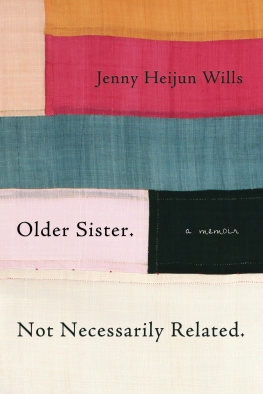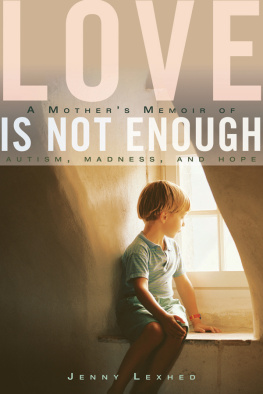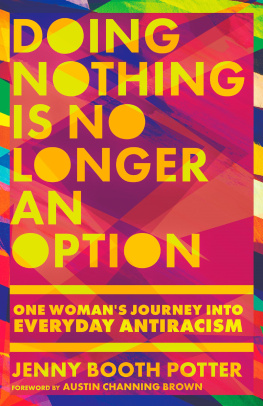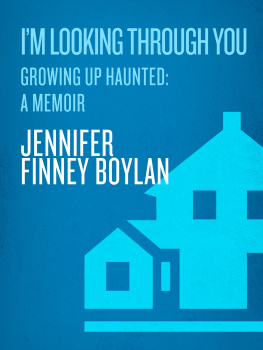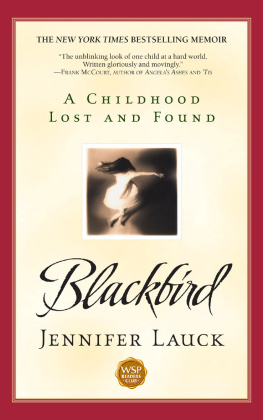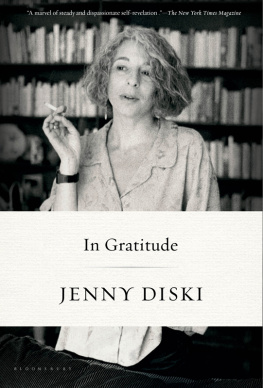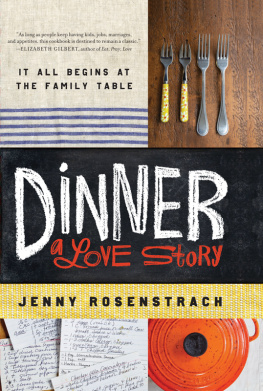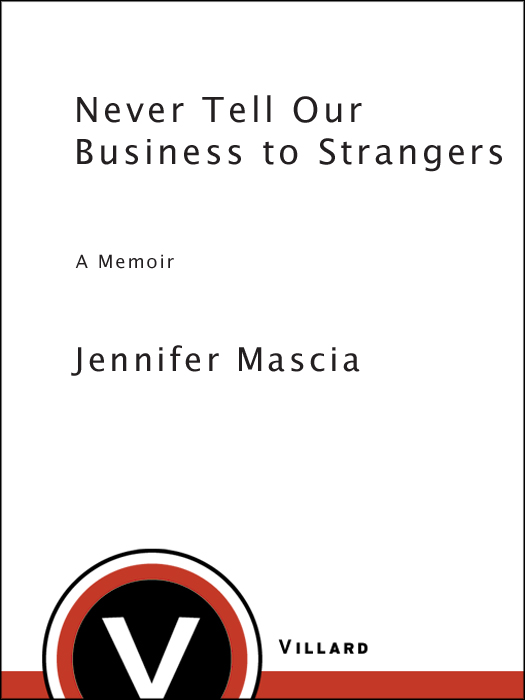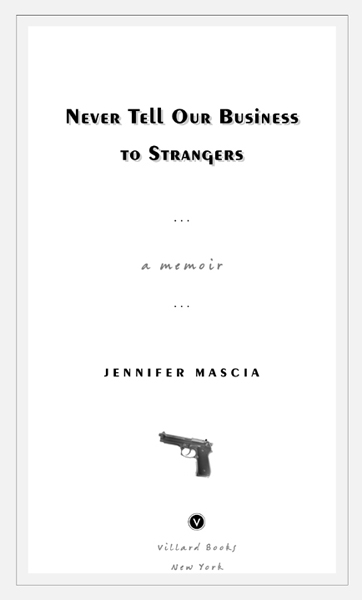To Eleanor and Johnny,
for refusing to live a normal life
Lady Bracknell: Are your parents living?
Jack Worthing: I have lost both my parents.
Lady Bracknell: To lose one parent, Mr. Worthing,
may be regarded as a misfortune;
to lose both looks like carelessness.
Oscar Wilde,
THE IMPORTANCE OF BEING EARNEST
PROLOGUE
I F I HAD MY WAY, THIS IS HOW MY LIFE WOULD BE:
Id sleep in, as usual, because my workday starts at 4:30 P.M. When I finally stirred, around noon, Id check my phone and see that Ive already missed two calls from the same number. Id call my mother, and make plans for Sunday dinner with my parents at their apartment, just over the Verrazano Bridge in Staten Island, starring The Sauce: a cooperative effort involving tomato paste, meatballs, sausage, and a large sheet of pork fat for flavoring. Accompanying The Sauce would be a tomato, onion, garlic, and olive oil salad (no lettuce) in one of their good blue Arabia ware pasta bowls from Finland. I detested this tomato and onion salad (no lettuce!), but Id make use of it anyway, as the tomato-and-onion-infused olive oil was especially good for dipping the soft, warm Italian bread theyd heated up in the oven.
As I sipped my wine Id be force-fed a curious cocktail of my mothers kvetching over every inch of my life, her concern regarding my admittedly shady paramours, her contention that I am not nearly ambitious enough (true), and, as a confusing chaser, beaming pride that her only child lives in the city, has a good job, has been published in the Newspaper of Record, and supports herself (as I probably wouldnt have bothered them for money).
My father would attempt to rein in my mothers nagging with wisecracks and behind-her-back smirks as he emptied the steaming spaghetti into a colander in the sink. Then, to show he was just kidding, hed make a funny face and flash his gap-toothed grin, even though he was deeply ashamed of his missing teeth. Id listen to the two of them fiddling in the kitchen and, sensing dinner was imminent, reluctantly tear myself away from 60 Minutes to set the table with the requisite paper napkin, fork, knife, butter, bread, and glasses, times three. We wouldnt need a knife to cut the bread, because my father would use the Italian knifehis thick, stubby hands. In a few minutes his nose would be running from the liberal dusting of red pepper flakes with which hed coated his pasta. (He wasnt really enjoying a red sauce unless it made him cry.) My mother would sit down last, martyr that she is, and finish eating first.
Oy, Im gonna bust, shed say after the last bite and relax into her chair while my father scooped up seconds. After dinner wed have cawfee, and my dad would nibble on a sfogliatellaa crispy layered Italian pastry stuffed with ricotta cheeseand, while my mother would feign disinterestStop it, Johnny, I have no room!a piece somehow always ended up in her mouth.
At the end of the night one of my parents would drive me up the hill to the X1 express bus, which would take me back to Manhattan. Theyd let me wait in the car, which was convenient if it was very hot or very cold, until I saw the bright yellow lights of the bus in the rearview mirror. Wed restrict ourselves to small talkYou got everything? Whaddya doing tomorrow?because we knew the buss arrival would quickly yank us apart. But before the bus reached the Brooklyn side of the Verrazano, my phone would vibrate and the familiar number would show up on the caller ID and Id already be deep in conversation with my mother, gabbing about everything and nothing all at once.
Thank you for coming, my mother would say.
Thank you for having me, Id say.
I love you so, so much, shed say.
I love you, too, Mama, Id reply, gazing out the window at the sparkling Manhattan skyline, beckoning to me as I made my way through Brooklyn. And then, just when I was about to hang up:
And, Jenny, you may love him, but your boyfriend is a loser.
Ma! Id shout into the phone, startling the slumbering weekend commuters on the darkened bus. She always had to have the last word.
The next day my week would begin again, and another after that, until my life changed: marriage, career progression, a family of my own. My parents would have made superb grandparents: my father, so good with kids, so lovable and engaging, and my mother, who gained the trust of children by speaking to them like they were adults. But all of that will never be. I havent actually uttered the words Mama or Daddy in several years, the syllables vanishing from my vocabulary when I wasnt looking. My parents dont know where I work; last either of them knew I was waiting tables in a restaurant. I havent actually set the table with a napkin, knife, and fork in several years, choosing instead to sit with a plate in front of the television on the rare occasion I prepare a meal at home. My mother didnt live to see me dye out my grays for the first time, my father didnt live to see me go to graduate school, or even graduate from collegehe missed it by a month. Dad was also spared 9/11, and the Iraq war, and my mother didnt live long enough to see America elect an African American president, something she would have savored, since shed traveled down to Washington to hear Martin Luther King, Jr., deliver his I Have a Dream speech forty-five years earlier. When (or if) I ever marry, when I have a child, when I finally pay off my student loan debt, all of these things will go unreported to the two people who mattered to me the most. There is no family home to visit on the other side of the Verrazano, no simmering Sauce to be stirred.
I could choke to death on what might have been.
My father died at sixty-four, my mother at seventy-one. They were too young, though I suppose I should be grateful I had them at all. I never imagined Id live most of my life without parents, but unless I die especially young, that will be my reality. And in a way I hope it is: If there is one thing I have learned to fear, it is death, which has run roughshod over me, robbing me of my family, as I sat helpless to stop it.
But this wasnt always the case. I had a family, however imperfect, and not that long ago. I had a life, albeit one that doesnt remotely resemble the one Im living now. Where there was once a house full of laughter and argument and cooking smells there is now nothing, just a furnished reverie that exists only in my memory. Sometimes I wonder if my time with them was real. I could say I conjured it from the ether and no one would be the wiser, because there is no one left to corroborate my past. As a journalist I have been trained to find two sides to each story, and often more. But now I only have mine.
CHAPTER 1
150 Rockview
Irvine, California
May 1983
I WAS FIVE WHEN THE FBI CAME FOR MY FATHER. TWICE. THE FIRST time, I was alone with him in our two-story condo in Turtle Rock, a new development in Irvine, California, when two agents knocked on our door one sunny afternoon just before Christmas. They wanted to arrest him right then but couldnt, as I would be left home alone, so he called my mother, who sped to the house with her boss. When they arrived, agents cuffed my father and took him away. I turned to my moms boss, also a family friend of ours, and asked him, Jesse, are they arresting my daddy?
No, honey, Jesse replied, kneeling down next to me. Its not real. Theyre making a movie. Of course I didnt know it was the FBI who had come to take my father, nor do I remember my father being led away in cuffs or my exchange with Jessemy mother told me about it years later. But that episode represents the final blind spot in my memory, as I remember everything after that.


